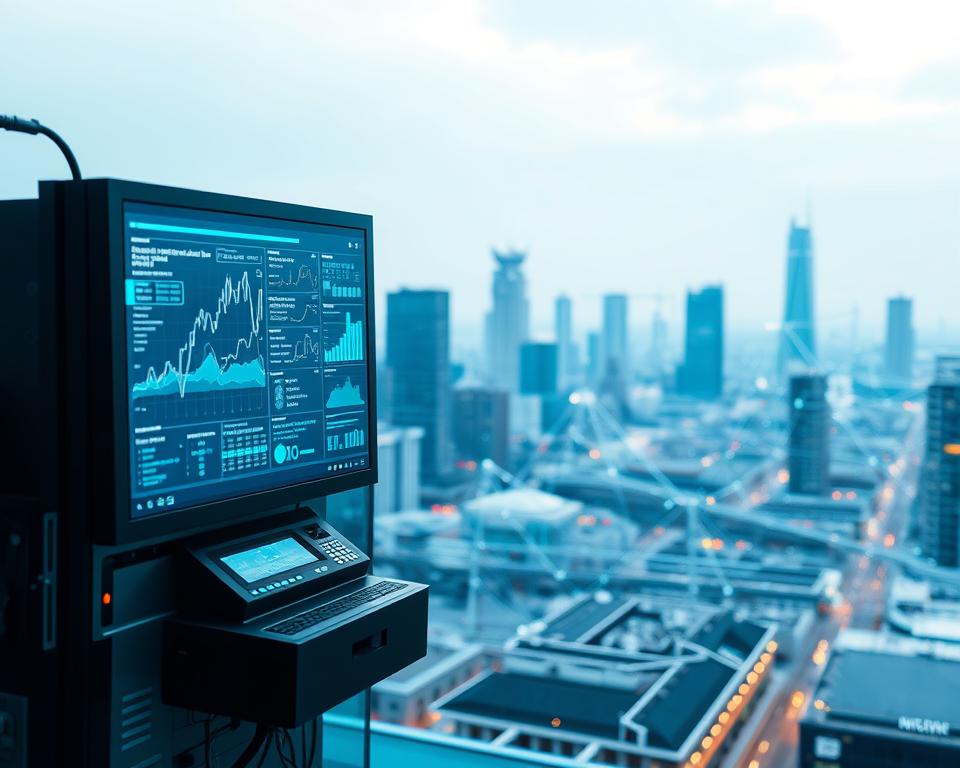Improving Safety via Hospital Security Guards
Did you realize that medical centers experience roughly 30 violent episodes each day? This eye-opening number points to the indispensable part played by Hospital Security Guards. They protect not just patients but also staff and confidential information. In today’s fast-changing healthcare world, robust Healthcare Facility Security is key. It’s about creating safe spaces where patients can get care without fear of violence or data breaches.
Collaborating with established experts such as Divine Protection Services strengthens Medical Center Security Services. This guarantees that security remains foremost while maintaining accessibility. This guide looks at how 24/7 security guards approaches and monitoring tools can markedly upgrade safety measures. It deals with both internal and external risks competently.

Core Takeaways
- Hospital Security Guards serve a critical function in shielding patients, employees, and private data.
- Healthcare Facility Security is vital to reduce violent episodes and protect privacy.
- Integrated security solutions amplify the overall performance of hospital security services.
- Aligning with organizations like Divine Protection Services provides bespoke security solutions.
- Innovative technologies support modern medical facility security approaches.
- Harmonizing accessibility with confidentiality is necessary for successful hospital security practices.
The Importance of Hospital Security
Hospital security is critical for the safety of patients and staff, as well as the protection of sensitive information. The escalation of violence in medical environments points to the importance of vigilant Hospital Security Guards. Such guards are crucial for sustaining a protected atmosphere and preserving the rights and dignity of all.
Enforcing robust Healthcare Facility Security plans is fundamental to stop violent behavior. This helps in creating a compassionate environment, improving the patient and family experience. It moreover confirms compliance with standards like HIPAA, mandating secure access management to defend Protected Health Information (PHI). Such measures not only safeguard patients but also foster trust between healthcare providers and their communities.
| Type of Security Measure | Value | Adherence to Rules |
|---|---|---|
| Access Control Systems | Limit unapproved entry and permissions | Crucial for HIPAA adherence |
| Surveillance Cameras | Observe events and prevent illicit acts | Aligns with rules for secure environments |
| Emergency Response Plans | Provide quick responses to incidents | Aligned with safety protocols and emergency management standards |
| Training for Security Personnel | Equip staff with skills to handle crises | Ensures compliance with safety standards |
Putting funds into solid security systems and staff training is critical for defending hospitals and healthcare environments. These protocols ensure a safe and compliant environment, vital for delivering quality patient care.
Importance of Hospital Security Guards
Hospital security guards play a vital role in keeping healthcare facilities safe. They guard access ways to block unapproved entry, respond to crises, and apply conflict management to forestall risks. Trained by Divine Protection Services, they recognize and mitigate signs of distress or violence.
Their presence is key to the safety and well-being of patients and staff. They defend the facility’s operations, necessary for a restorative environment. By delivering security, they enrich patient care and lower risks.
Modern Technologies in Healthcare Security
Modern healthcare environments increasingly rely on Advanced Technologies to bolster security measures. Medical Center Security Services effectively integrate systems like AI-driven surveillance cameras, which enhance monitoring capabilities. Such cameras provide live tracking and analytics, allowing teams to detect and address risks promptly.
A major element in Healthcare Security Solutions involves deploying access control systems. These platforms confine access to secure zones, assuring that only credentialed staff reach important areas. By leveraging biometric authentication, medical centers can integrate extra security around patient data and vital medical apparatus.
AI-enhanced security systems are fundamental to physical protection. Facial scanning and conduct detection help security staff to act swiftly on security violations. Advanced video analytics facilitate operational decision-making, maintaining continuous oversight of hospital environments. This cultivates a secure space for personnel and patients.
| Tech Tool | Deployment | Gains |
|---|---|---|
| AI-driven Surveillance | Instant observation | Immediate threat identification |
| Access Control Systems | Restricted entry | Securing critical zones |
| Facial Recognition | Personal identification | Stopping unapproved entry |
| Video Analytics | Operational oversight | Informed operational choices |
Leading Technologies do more than guard hospital resources—they also build a protected atmosphere for all. By investing in these cutting-edge tools, healthcare facilities can remain vigilant against security threats. This secures quality care delivery for patients.
Medical Center Security Strategies
Solid Healthcare Facility Security frameworks are crucial for defending patients, staff, and visitors in healthcare centers. Executing detailed risk analyses is the basis of these approaches. By detecting flaws, healthcare institutions can formulate specialized plans for various cases. This boosts their readiness for any incidents that may occur.
It’s crucial to promote the reporting of suspicious activities and dangers. Healthcare institutions must establish mechanisms to handle those alerts immediately. This anticipatory position in Healthcare Facility Security builds a community-wide safety mindset.
Handling visitor flow is a fundamental element of Medical Center Security Services. Confirming that only sanctioned people enter maintains a secure atmosphere. Watching over patient-caregiver interactions helps diminish risks. This creates a safer space for all. Below you’ll find a table showcasing central aspects of strong security strategies.
| Security Element | Overview | Outcomes |
|---|---|---|
| Risk Assessments | Uncovering vulnerabilities and gauging potential threats. | Increases readiness and reaction effectiveness. |
| Incident Reporting | Encouraging the community to report suspicious activity. | Facilitates timely responses to threats and increases awareness. |
| Visitor Management | Protocols for monitoring and controlling access to facilities. | Strengthens safety and diminishes illicit access. |
| Staff Training | Delivering security instruction to employees. | Empowers staff to handle security incidents effectively. |
Equipping Security Teams Efficiently
Proper training of hospital security staff is critical for upholding safety in medical centers. Ongoing learning aids employees in adjusting to emerging threats. It additionally improves their skill in handling diverse incidents.
Divine Protection Services focuses on cultivating robust situational awareness among security teams. This encompasses mastering conflict resolution techniques for tense interactions. Consistent practice drills and role-play exercises reinforce policies. Personnel gain the ability to handle risks swiftly while maintaining respect and dignity.
This training strategy for security teams extends past basic defense techniques. It encourages a climate of safety and professionalism across healthcare facilities. By concentrating on fundamental abilities, hospitals ensure their security officers manage challenges adeptly.
Compliance with Regulatory Standards
Conforming to Regulatory Standards is indispensable for healthcare facilities that prioritize safety and trust. HIPAA, specifically, enforces secure access management to defend Patient Health Information (PHI). These procedures stop unapproved access and guard against data leaks.
Medical centers can enhance their compliance by implementing comprehensive policies. They involve recurring reviews, personnel instruction, and transparent incident notification procedures. These steps not only ensure patient well-being but also foster community confidence.
Agencies like Divine Protection Services supply bespoke compliance strategies for hospitals. Their proficiency in Hospital Security Services assures that security personnel are able to satisfy regulatory demands.
Devotion to compliance mitigates risks and fosters solid patient-provider bonds. A proactive view on regulations aids the entire healthcare infrastructure.
Hospital Security Officers in Practice
Hospital Security Officers are vital in keeping healthcare facilities safe. Their efforts appear in numerous practical scenarios, showcasing their anticipatory methods. For instance, they oversee disputes in waiting rooms, swiftly settling them to avert escalation.
During critical situations, these guards accompany people to secure spots, aiding them when needed. This practice secures those who are vulnerable and upholds a serene atmosphere. Their collaboration with authorities during critical events spotlights the role of Professional Healthcare Security. They commonly serve as the frontline responders.
Education provided by Divine Protection Services trains these guards to respond to emergencies adeptly. They are taught to apply regulations while preserving everyone’s dignity. This blend of authority and compassion turns them into vital components of the healthcare team. They endeavor to maintain safety and security for every person in the facility.
Tailoring Security Solutions for Medical Centers
Healthcare institutions confront distinct security hurdles that necessitate a personalized approach. Customizing Security Solutions is key to effectively tackling these issues, ensuring a safe space for both patients and staff. Partnering with professionals like Divine Protection Services lets hospitals design security programs suited to their unique demands.
A well-rounded security program covers critical areas like violence prevention and medication security. Through advanced tech, facilities can enhance their security practices while following HIPAA guidelines. This typically involves visitor screening platforms and adaptable access control systems to suit changing requirements.
The role of Medical Facility Guards is also vital. They benefit from targeted training to deal with security episodes and ensure sustained vigilance. Their visibility deters potential threats and instills confidence in employees and patients.
The table below shows how Customizing Security Solutions addresses various healthcare challenges:
| Security Concern | Personalized Remedy |
|---|---|
| Violence Prevention | Educating Medical Facility Guards in conflict de-escalation methods |
| Medication Security | Setting up protected drug cabinets and surveillance solutions |
| Visitor Management | Advanced visitor screening and badge issuance processes |
| Access Control | Adaptive access control systems that adjust based on facility activity |
By carefully planning and partnering with the right organizations, healthcare facilities can establish a strong security posture. This stems from Adapting Security Solutions to their distinctive demands. Combining human oversight with technology significantly improves safety, leading to a more secure and efficient healthcare setting.
Final Thoughts
Safeguarding the security and welfare of patients, staff, and private information is fundamental in healthcare settings. Hospital Security Guards currently leverage state-of-the-art technology and education to address modern dangers. This advancement not only shields physical premises but also strengthens trust between patients and healthcare professionals.
Tailored Healthcare Security Solutions enable hospitals to lead in the evolving security environment. Partnering with experienced firms like Divine Protection Services equips healthcare facilities to handle safety concerns effectively. By integrating workforce training with advanced tech, hospitals can develop a safe environment for medical treatment and care.
The health sector grapples with escalating risks, making professional security steps vital. Hospitals have to integrate these progressing strategies to fortify their environments and uphold operational honor.


